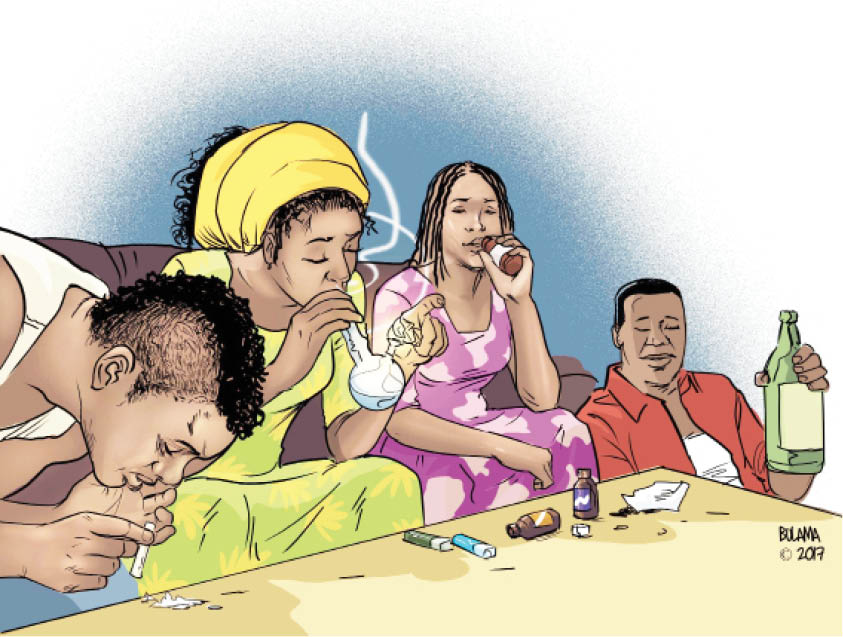The upsurge in the incidences of mental disorder in the country is being driven by the menace of substance abuse and increment in neurological diseases, Bamidele Owoyele, a renowned academic and Professor of Physiology at the University of Ilorin, has said.
He said mental health disorders are on the rise in the country and that one out of every four Nigerians suffered from a mental health disorder.
- The shocking story of Igbo Muslims & why they are going North (II)
- Working 55hrs weekly increasing deaths from heart disease, stroke -WHO, ILO
Causes
Prof Owoyele explained that so many things could cause mental disorder; ranging from what we eat like psychoactive substances which damage or reduce the effective functioning of some neurons in parts of the brain to abuse, bereavement and heredity problems.
“This can be due to exposure in the environment to radioactive materials like consuming water that contains heavy metals like lead. There is also psychological problem like when somebody is abused or the family is not well set up. At times, it is difficult to overcome the loss of a very close person, such can precipitate, aside from it being genetic or hereditary. Been exposed to too much stress in the environment can lead to mental illness,” he said.
Signs
The expert said abnormal and irrational behaviour is a sign of mental illness. This includes being moody and withdrawing from people and being hyper active beyond normal.
“At times, they claim to be seeing things which are ordinarily not there and they may indulge in food and sexual activities and become very harmful; killing people and even themselves in the process. So if you see somebody that was very social and interactive suddenly getting withdrawn, these are red signs.
“They may also become dependent on drugs and without it cannot get fulfilled. Some of them may be sickly continuously. You can have a case that the individual will be non-discreet about sexual relationship as a result of a damaged part of the brain resulting to inappropriate sexual relationship or sexual addiction and promiscuity.
“They may be eating excessively at time and they may get withdrawn from food. They sometimes don’t take caution and start to beat or use dangerous things to harm or kill themselves aside consumption of poison,” he explained.
COVID-19 and mental health
According to Prof Owoyele, COVID-19 has contributed to the rise in mental disorders.
“The stress in the society increased because movements were restricted during the lockdown and things were really bleak. Many people came down with one form of mental illness or the other.
“So stressful environment at home, work and between spouses can lead to it; or any toxic environment. We should also know that Covid-19 itself has the ability to influence the functioning of the brain and what people are even saying now is that those who have recovered still have some of its effects on their mental performance. The effect of lockdown increases the stress in the society and can lead to abnormal individual behaviour unexpected ordinarily from them,” he said.
Prevention
Owoyele, who is the President of Ilorin Neuroscience Group (ING) said there is need to avoid substance abuse, and for environment at home, workplaceto be conducive. Another thing is for us to protect ourselves against mental health disorders.
“A family set up that is replete with shouting and lack of understanding is not ideal. Basically at home, there should be exhibition of some good behavior; we should behave responsibly and promote understating.
“We must desist from taking cocaine and other psychoactive drugs,” he advised.
He further said the government should implement policies that protected people from depression and stigmatisation when they suffered from mental disorders.
“The solution generally is to reduce the stress in the society, and those who have come down with one form of mental illness or the other should be treated rather than being stigmatised.
“People are quick to ascribe terrible things to those suffering from mental illness, but that is far from the case. Mental illnesses are just like any other illnesses and scientists have advanced and are still working to produce drugs that can be used. So people should seek appropriate treatment rather than patronising quacks until it becomes too chronic to handle,” he advised.
Speaking during the maiden global engagement and advocacy programme organised by the ING in conjunction with the International Brain Research Organisation (IBRO) at the University of Ilorin, the don called on governments at all levels to allocate more budgetary provision for the health sector, saying about two per cent allocation often set aside for the health sector was too small for the health needs of the country.
He also called on philanthropists in the country to emulate their counterparts in the advanced world by assisting in the funding of research which would generate efficacious solutions to brain-related diseases.
The ING president further implored concerned authorities to engage in more public enlightenment programmes to educate members of the public on research participation, adding that such effort helped in the early detection of some neurological disorders and discovery of therapeutic interventions.
Training of professionals
Prof Owoyele also called for more training of experts in the field of mental health to address the growing level of neurological deficits among the nation’s population, saying that effort should also be targeted at reducing the number of medical experts who were leaving the shores of Nigeria for greener pastures abroad.
On trado-medical patronage
“The best way is to take those with mental illness to those who have studied properly and have scientific evidence that can administer drugs that have effect with sound background of the relationship of these drugs. Although I don’t doubt the fact that our traditional healers are working because there are things in our environment that can be taken that help the individual, there is need for increased collaboration among the trado-medical practitioners, scientists and healthcare providers on the issue. It cannot be entirely waved aside, but people should weigh the evidence before taking their patients to trado-medical practitioners,” he explained.

 Join Daily Trust WhatsApp Community For Quick Access To News and Happenings Around You.
Join Daily Trust WhatsApp Community For Quick Access To News and Happenings Around You.


